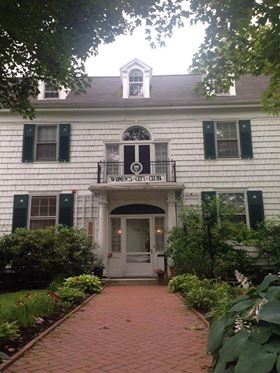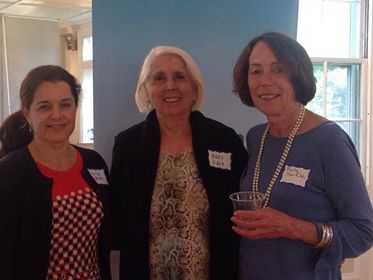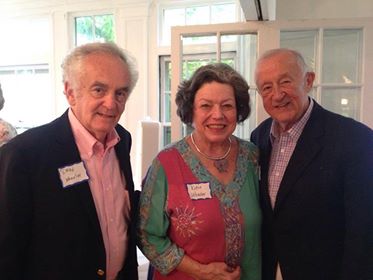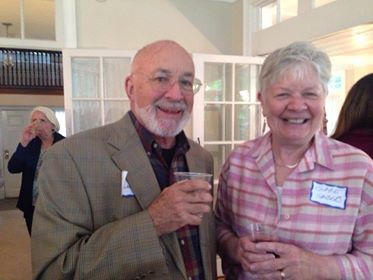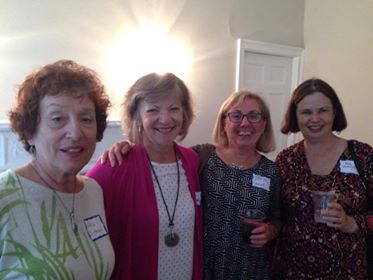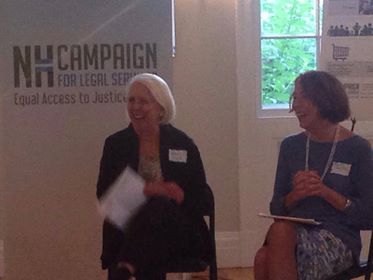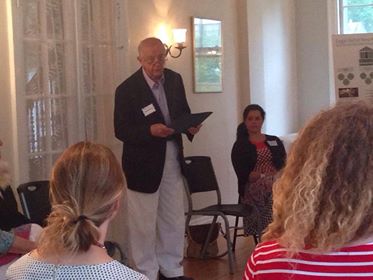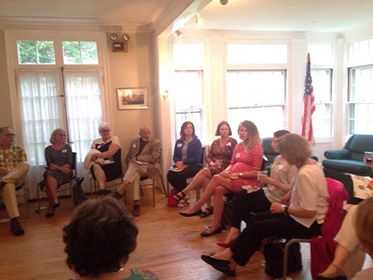Recognizing the impact of legal aid for low-income women
July 13, 2017 – PORTSMOUTH, NH
Supporters of legal aid and social justice gathered at the Portsmouth Women’s City Club last week to recognize the important impact legal aid has for low-income women in New Hampshire’s Seacoast communities.
Thank you to our sponsors for this event, McLane Middleton and Renee Plummer!
Between 60 and 70 percent of legal aid clients in New Hampshire are women. So far this year, New Hampshire Legal Assistance closed almost 90 cases so far this year for women in the Seacoast region alone and the Legal Advice and Referral Center processed nearly 300 applications from women in the Seacoast area. In total, the two groups have helped almost 6,000 people statewide so far in 2017.
Campaign Co-Chair Erica Bodwell with Campaign Leadership Council members and Event Hosts Mary Rauh and Marty Van Oot
Guests enjoying the Portsmouth Women’s City Club, including Terie Norelli and NHLA Litigation Director Kay Drought
Mary Rauh and Marty Van Oot told the guests that more than 90 percent of domestic violence victims report needing civil legal help after leaving their abuser
Jack Sanders read a letter from Sen. Jeanne Shaheen, D-NH, in honor of the work of legal aid advocates in New Hampshire
Remarks of Erica Bodwell, Campaign Leadership Council Co-Chair
I’ve been thinking lately about privilege. It may be because I have two boys. Both are millennials. Both are white, upper middle class men with parents who went to college and have professional degrees. Both are highly concerned with social justice issues including economic inequality and gender discrimination. Of course, their concerns are for others. They have that luxury. They’re lucky.
As a woman in the C-suite of corporations for the last ten years, I have been in the minority. I imagine this is true for most of my women colleagues here today. We have a range of experiences from out and out harassment to being left out of the “boys’ club” to the systemic bias, unconscious and unseen, that makes us have to dance backwards and in high heels. This is what we all know as the glass ceiling, the way ingrained cultural systems can unintentionally hold people back.
For women at the other end of the economic spectrum — their progress, their well-being and in many cases their very lives — are threatened by “the sticky floor.”
The sticky floor is what holds back women who work in the jobs that make our society function: our child care professionals, our home health care professionals, our restaurant servers.
Life on the sticky floor is precarious. It’s a combination of things: low wages, student debt, the high costs of housing and child care, and the increase in single-parent households, most of them led by women.
It’s these women who are most in need of civil legal aid. Between 60 and 70 percent of legal aid clients in New Hampshire are women. NHLA closed almost 90 cases so far this year for women in this region alone. LARC processed nearly 300 applications from women in the Seacoast area in the last 6 months.
When a school won’t provide a child with the special education services he needs, legal aid is there.
When a woman stands up to her landlord about mold or vermin, or broken appliances or faulty plumbing, she risks being evicted as retaliation, and she risks being assaulted, too, to be honest. But legal aid is there to defend her.
When woman in an abusive relationship worries she can’t afford a safe home of her own, legal aid is there to advise her she can request court-ordered child support with a protective order.
We know that when a society supports women, life improves for children. And we know then when women’s basic needs for safety and security are met, business needs are met, as employees are able to show up and focus on their work. As my mother said, Women hold up half the sky.
So when legal aid helps women, it helps children, it helps employers, it helps all of us. And we know that legal aid works. My friend Jack Sanders has a favorite statistic he shares with groups like this: When a woman applies for a protective order on her own, she has about a 33% chance of receiving it. When she has help from legal aid, her chances of getting that protective order go up to 80 %.
But too often, legal aid isn’t there, because these programs simply don’t have the capacity to serve everyone.
That’s why Victoria and her colleagues try to find cases that will improve the systems affecting women in need throughout the state. Thank you for your work on that case and all your cases, Victoria.
Securing public funding for NHLA and LARC is not going to get any easier. Governor Sununu put an extra $300,000 a year in his budget for legal aid in our north and west regions. That area was chosen because of the high rate of poverty, and the fact that very few private attorneys practice there, so the pool for pro bono volunteers is small and shrinking each year. But that funding was cut by the House.
The Legal Services Corporation is on the chopping block in President Trump’s proposed budget. Losing its $700,000 annual appropriation from LSC could effectively close the Legal Advice and Referral Center, which helped more than 4,000 people last year.
The Campaign can’t – yet! – replace all of that funding. We’re working hard to tell more people every year about how important these programs are. How many crises legal aid prevents every year. We need your voice. Please tell your colleagues, your neighbors, your friends, about legal aid and ask your company or your firm to match your gift.
Equal standing before the law is a fundamental American value for all, it not a privilege for the few.

